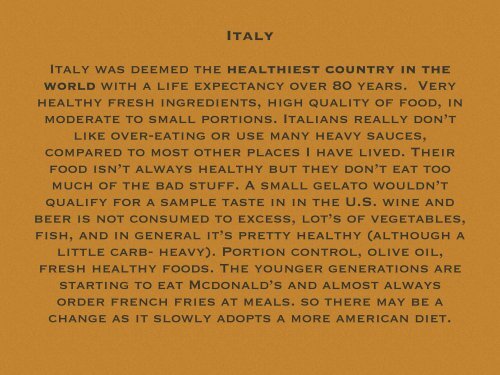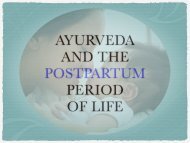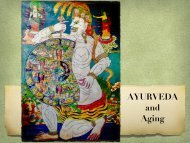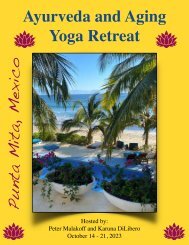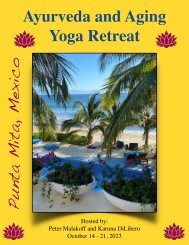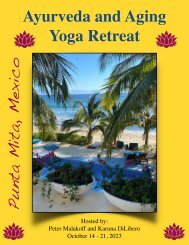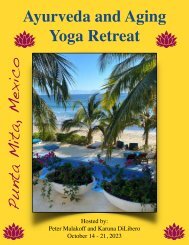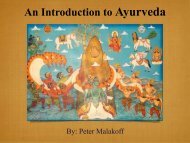INTRODUCTION to AYURVEDA 12/17/19 DA
This is an Introductory Presentation on Ayurveda containing nearly 600 slides. I put this course together over the past fifteen years and have used it in Yoga Teacher Training programs in the United States as well as Introductory classes on Ayurveda for the general public in India. The slides are like sutras (threads), meant to be commented on and expanded. Each slide is 'unpacked' and commented on and like a ‘sutra,' and all will be strung together as beads on a string. I offer a wide-ranging commentary during a 7-10 day training considering many of the fundamental principles, concepts and practices of Ayurveda and the Vedic-Sankhya-Yoga tradition on which it is based- I have a degree in religious studies from UCSB where I focused on Hinduism, Buddhism, World Mythology and Hermeneutics. I am thankful to my Ayurveda teacher, Dr. Sunil Joshi, for sharing this great Vidya (Wisdom tradition) with me in the United States and at Kalidas Sanskrit University in Nagpur, India, from which I graduated in 2004. There are different fields of focus in Ayurveda and every practitioner has his or her area of expertise. As for myself, I concentrate on preventing disease rather than treating illness. There is a saying in Ayurveda: “If a person’s diet and lifestyle are wrong, what good are herbs or medicines? If a person’s diet and lifestyle are good, what need are herbs and medicines?” Here are a few quotations from medical traditions that were influenced by Ayurveda and may help to clarify my approach: “The sages did not treat those who were already ill, they instructed those who were not yet ill. To administer medicines to diseases which have already developed is comparable to the behavior of a person who begins to dig a well after they have become thirsty. Would this not be too late?” - Yellow Emperors Medical Treatise (300 BC) In my practice and teachings I also concur with Maimonides, the 12th century Jewish physician,honored by Jews, Moslems and Christians in the Middle East: “The physician should not treat the disease but the patient who is suffering from it, and no disease that can be treated by diet should be treated with any other means.” If you are interested in having me present this course, please contact me: Peter Malakoff petermalakoff@gmail.com www.petermalakoff.com
This is an Introductory Presentation on Ayurveda containing nearly 600 slides. I put this course together over the past fifteen years and have used it in Yoga Teacher Training programs in the United States as well as Introductory classes on Ayurveda for the general public in India.
The slides are like sutras (threads), meant to be commented on and expanded. Each slide is 'unpacked' and commented on and like a ‘sutra,' and all will be strung together as beads on a string.
I offer a wide-ranging commentary during a 7-10 day training considering many of the fundamental principles, concepts and practices of Ayurveda and the Vedic-Sankhya-Yoga tradition on which it is based- I have a degree in religious studies from UCSB where I focused on Hinduism, Buddhism, World Mythology and Hermeneutics.
I am thankful to my Ayurveda teacher, Dr. Sunil Joshi, for sharing this great Vidya (Wisdom tradition) with me in the United States and at Kalidas Sanskrit University in Nagpur, India, from which I graduated in 2004.
There are different fields of focus in Ayurveda and every practitioner has his or her area of expertise. As for myself, I concentrate on preventing disease rather than treating illness. There is a saying in Ayurveda:
“If a person’s diet and lifestyle are wrong, what good are herbs or medicines? If a person’s diet and lifestyle are good, what need are herbs and medicines?”
Here are a few quotations from medical traditions that were influenced by Ayurveda and may help to clarify my approach:
“The sages did not treat those who were already ill, they instructed those who were not yet ill. To administer medicines to diseases which have already developed is comparable to the behavior of a person who begins to dig a well after they have become thirsty. Would this not be too late?”
- Yellow Emperors Medical Treatise (300 BC)
In my practice and teachings I also concur with Maimonides, the 12th century Jewish physician,honored by Jews, Moslems and Christians in the Middle East:
“The physician should not treat the disease but the patient who is suffering from it, and no disease that can be treated by diet should be treated with any other means.”
If you are interested in having me present this course, please contact me:
Peter Malakoff
petermalakoff@gmail.com
www.petermalakoff.com
You also want an ePaper? Increase the reach of your titles
YUMPU automatically turns print PDFs into web optimized ePapers that Google loves.
Italy<br />
Italy was deemed the healthiest country in the<br />
world with a life expectancy over 80 years. Very<br />
healthy fresh ingredients, high quality of food, in<br />
moderate <strong>to</strong> small portions. Italians really don’t<br />
like over-eating or use many heavy sauces,<br />
compared <strong>to</strong> most other places I have lived. Their<br />
food isn’t always healthy but they don’t eat <strong>to</strong>o<br />
much of the bad stuff. A small gela<strong>to</strong> wouldn’t<br />
qualify for a sample taste in in the U.S. wine and<br />
beer is not consumed <strong>to</strong> excess, lot’s of vegetables,<br />
fish, and in general it’s pretty healthy (although a<br />
little carb- heavy). Portion control, olive oil,<br />
fresh healthy foods. The younger generations are<br />
starting <strong>to</strong> eat Mcdonald’s and almost always<br />
order french fries at meals. so there may be a<br />
change as it slowly adopts a more american diet.


